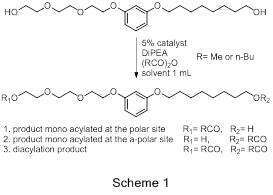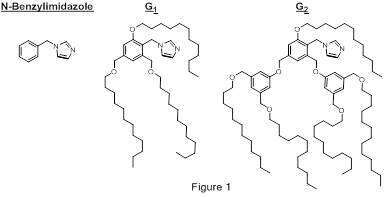
DESIGN AND SYNTHESIS OF A PROBE AND HIGHLY BRANCHED ORGANOCATALYSTS AND A SUBSTRETE PROBE FOR STUDY OF SITE–SELECTIVE TRANSFORMATIONS
Site-selective acylation organocatalysts are a promising approach for preparing derivatives of polyhydroxylated natural products. For this purpose, we synthesized a molecular probe for acylation reaction that includes two reactive sites, which are situated in different environments (polar and lipophilic). Such design allows examining the tendency of various catalysts to perform acylation at a specific site (Scheme 1).
We envisaged using the dendritic architecture in order to create a catalytic pocket of a specified polarity that resembles enzymatic active sites in its selectivity. Thus, we conceived a catalytic system composed of a dendrimer that incorporates a polar imidazole active site in the interior and an a-polar periphery that will create a hydrophobic envelopment of this catalytic site. We presume that the polarity differences between the dendrimer regions will impact the probe access path into the catalytic pocket and, consequently, allow a preferred reaction at a particular site.
First to second generation catalysts (Figure 1) were synthesized, examined under several standard sets of conditions and compared to a simple non dendritic analogue. The findings revealed a strong solvent effect that masks the polar gradient effect of the catalysts. However, As long as the catalytic site is enveloped by lipophilic tails the acylation of the a-polar site of the probe will be preferred.


Powered by Eventact EMS